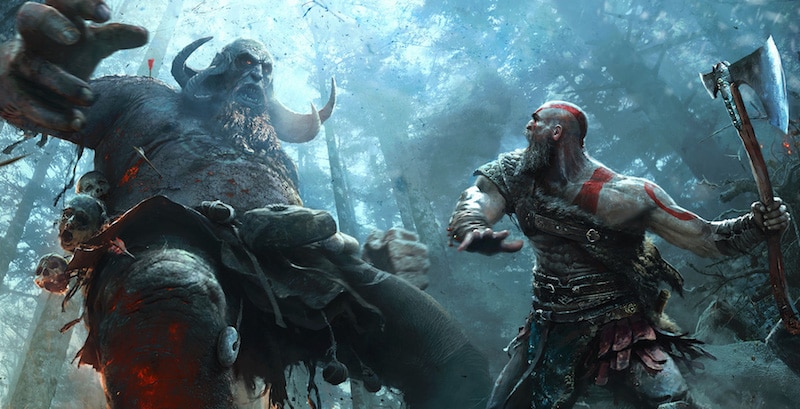- Home
- Games
- Games Features
- God of War Story and Ending Explained What Happened
God of War Story and Ending Explained - What Happened

If you’ve checked out our God of War review, you’d have probably realised its unlike anything we’ve seen from Sony’s long-running franchise. From its fresh take on combat, to the myriad ways to progress through the game, there’s a lot that’s different in 2018’s God of War. This extends to the game’s plot. It takes around 20 to 25 hours on normal difficulty to get through God of War’s main story, but if you’re a completionist, expect to play up to 50 hours to see everything the game has to offer. While it’s unlikely that all gamers will go that far, God of War’s plot is surprisingly intricate, with a host of revelations that extend beyond its initial few hours of play.
A word of warning here - if you haven’t played the game, we highly recommend you play it first before going any further, unless you’re fine with spoiling the experience for yourself. If the title didn’t give it away, there will be spoilers galore from here on out. Don’t say you weren’t warned.
Odin is the big, bad villain of this new God of War series
Yes, you read right. The Norse God is the one pulling the strings behind the events of this game. And while he’s not present, every character knows of him and their conversations give you an insight into his personality — a mix of curiosity and ruthlessness drives him. For instance, your ally Mimir tells you of the time he hanged himself in order to die and walk the land of the dead until he was thrown out and brought back to life - just to learn the secrets of death. Or there's the time he charmed, wooed, and married Vanir deity Freya to enhance his knowledge of Vanir magic, only to cast her to Midgard in exile once he learned what he needed. His son Baldur wants Kratos dead and chases after him (that is, you) and Atreus for most of the game.
Baldur is the mysterious stranger, Freya is the witch and they’re both related
Much like Norse mythology, God of War’s fiction ties these two characters together. The witch from the game's trailers is Freya. She heals Atreus, brings Mimir back from the dead, and is also Baldur's mother. Unbeknownst to her, Baldur is out to kill Kratos. While his motives are unclear for most part, Mimir says that Odin may have tricked Baldur into thinking that squaring off against Kratos is the only way for him to feel anything — pain or pleasure. Presented as a mysterious stranger impervious to Kratos' attacks at the game's beginning, it's later learned from other characters that he is indeed Baldur.
Throughout the game, Baldur is invincible, and he isn’t fond of it, despite shrugging off entire sections of rock thrown at him and surviving having his neck snapped by Kratos. In Norse mythology, this is because Freya makes every object in the world swear an oath not to harm her son, except the humble mistletoe. This lapse ends up leading to his demise. In the game, all of this is simply reduced to the vagaries of Vanir magic.
Kratos kills Baldur but it’s Atreus who is responsible
Early on, Atreus receives mistletoe arrows from dwarf merchant Sindri, as a reward for saving his life from a gigantic dragon. On meeting Freya, she says they’re dangerous without explaining why, and burns them save for a small piece that Kratos tied to Atreus’ quiver harness to keep it from breaking, which goes unnoticed. Towards the end, Baldur punches Atreus in the very spot where the mistletoe is, breaking the spell and rendering him mortal.
Kratos spares his life after a prolonged battle but chokes him to death after Baldur tries to kill Freya (for inflicting him with the invulnerability that robbed him of any sense of feeling for so long). This ends with Freya cursing Kratos for all eternity. When you’re done with the game, you can visit Freya’s abode but she won’t be there anymore. Perhaps plotting her revenge for the next game?
God of War ending: Atreus is Loki and his mother is a giant
If Atreus being responsible for Baldur’s death wasn’t enough, akin to the events in Norse mythology wherein Loki orchestrated Baldur’s demise, the game drives the point home further on. When Kratos and Atreus finally reach Jotunheim — the world of giants — they notice that all which had come to pass was inscribed on the walls of the realm. Atreus notices he’s referred to as Loki. Kratos explains that Loki was the name his wife and Atreus’ mother Faye wanted, before eventually settling on Atreus — in honour of a fallen comrade of Kratos from his days as a Spartan soldier. And yes, it’s also revealed that Faye was a giant who, judging by the writings in Jotunheim, prophesied all of what came to pass. Including a blink and you miss scrawl that suggests the end of Kratos and Atreus by a mysterious being.
God of War brings forward Ragnarok by 100 winters
Just as you’re done scattering Faye’s ashes in Jotunheim, Mimir suggests that Kratos and Atreus may have brought about the end of the world or Ragnarok as it’s known in Norse mythology ahead by 100 winters. It’s a sentiment echoed by other characters like Brok and Sidri too. Although the passage of time in God of War is tricky. Reason being, the world serpent mentions that he knows Atreus even before having met him. Plus the flow of time appears to be different in different realms, offering the developers a possible way out in future games.
Kratos will fight Thor in God of War 2
The game seems to end on a cliffhanger with Thor knocking on Kratos’ door, no surprise since his sons Magni and Modi die by your hand. We see a fleeting silhouette of Thor, and a glimpse of his hammer before the credits roll. However God of War doesn’t end here. Post-credits, Atreus mentions he had a dream where Kratos would fight Thor. You’re then free to explore the game world.
What does all of this mean? For one, expect the God of War sequel to have less fan service moments like cameos of Athena and Zeus — crucial characters in earlier entries. Though we won’t be surprised to see Kratos’ blades being a default weapon option in the next game. How Atreus evolves as a character will be interesting to see as God of War ends with him realising the legacy of his parents and his own godhood. It also sets us up for a game that would have you massacring a large chunk of the Norse pantheon, never a bad thing. Finally, we could see Freya and Odin unite over the death of Baldur, and be the driving force for the events of the next game, in addition to Thor seeking revenge for the demise of his sons. And who knows, maybe alongside all of these existing threads of narrative, we could see Santa Monica Studios weave some new ones along the way to keep things fresh.
If you're a fan of video games, check out Transition, Gadgets 360's gaming podcast. You can listen to it via Apple Podcasts or RSS, or just listen to this week's episode by hitting the play button below.
Get your daily dose of tech news, reviews, and insights, in under 80 characters on Gadgets 360 Turbo. Connect with fellow tech lovers on our Forum. Follow us on X, Facebook, WhatsApp, Threads and Google News for instant updates. Catch all the action on our YouTube channel.
Related Stories
- Samsung Galaxy Unpacked 2025
- ChatGPT
- Redmi Note 14 Pro+
- iPhone 16
- Apple Vision Pro
- Oneplus 12
- OnePlus Nord CE 3 Lite 5G
- iPhone 13
- Xiaomi 14 Pro
- Oppo Find N3
- Tecno Spark Go (2023)
- Realme V30
- Best Phones Under 25000
- Samsung Galaxy S24 Series
- Cryptocurrency
- iQoo 12
- Samsung Galaxy S24 Ultra
- Giottus
- Samsung Galaxy Z Flip 5
- Apple 'Scary Fast'
- Housefull 5
- GoPro Hero 12 Black Review
- Invincible Season 2
- JioGlass
- HD Ready TV
- Laptop Under 50000
- Smartwatch Under 10000
- Latest Mobile Phones
- Compare Phones
- Samsung Galaxy F70e 5G
- iQOO 15 Ultra
- OPPO A6v 5G
- OPPO A6i+ 5G
- Realme 16 5G
- Redmi Turbo 5
- Redmi Turbo 5 Max
- Moto G77
- Asus Vivobook 16 (M1605NAQ)
- Asus Vivobook 15 (2026)
- Black Shark Gaming Tablet
- Lenovo Idea Tab Plus
- boAt Chrome Iris
- HMD Watch P1
- Haier H5E Series
- Acerpure Nitro Z Series 100-inch QLED TV
- Asus ROG Ally
- Nintendo Switch Lite
- Haier 1.6 Ton 5 Star Inverter Split AC (HSU19G-MZAID5BN-INV)
- Haier 1.6 Ton 5 Star Inverter Split AC (HSU19G-MZAIM5BN-INV)

















